| Srl | Item |
| 1 |
ID:
181882


|
|
|
|
|
| Summary/Abstract |
This study analyzes the rise of DC/EP (digital currency electronic payment) in China by proposing the concept of “recentralized authoritarian capitalism.” It first examines how recentralized authoritarian capitalism started in 2010 in the form of a recentralizing of regulations. After considering how the fintech firms have restructured their shareholding in response to the recentralizing regulations, I delineate how these firms further strengthen recentralized authoritarian capitalism, as exemplified by how Alipay has helped realize the Party’s plan to launch DC/EP.
|
|
|
|
|
|
|
|
|
|
|
|
|
|
|
|
| 2 |
ID:
181884
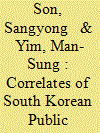

|
|
|
|
|
| Summary/Abstract |
What explains South Korean public opinion on nuclear weapons development? Despite the US security commitment, most South Koreans consistently support independent nuclear weapons development. To solve this puzzle, we investigate the mechanisms of security threat and security commitment under which individuals develop their opinion on nuclear proliferation. An original survey of 1,988 South Korean adults shows empirically supported correlates of South Korean public opinion on nuclear proliferation. Public support for proliferation is largely shaped by external security threats: nuclear threats from North Korea and China, but also the latent nuclear superiority of Japan. Public opposition to proliferation is fostered by the perceived credibility of the US security commitment, but not by its perceived effectiveness. The results provide insights into South Korean public opinion on nuclear proliferation and can inform the design of a nonproliferation policy tailored to South Korea.
|
|
|
|
|
|
|
|
|
|
|
|
|
|
|
|
| 3 |
ID:
181883
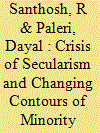

|
|
|
|
|
| Summary/Abstract |
This paper examines the changing nature of Muslim political mobilization in contemporary India in the context of Hindu nationalism’s ascendancy into power and the consequent crisis of traditional Muslim politics. Through an ethnographic case study of the Popular Front of India, we argue that a qualitatively new form of political mobilization is taking place among Indian Muslims centered on an articulation of “self-defense” against a “Hindu nationalist threat.” This politics of self-defense is constructed on the reconciliation of two contradictory processes: use of extensive legal pragmatism, and defensive ethnicization based on Islamic identity. The paper also examines the consequences of the emerging politics of competing ethnicization for even a normative and minimal idea of secularism and how it contributes to the process of decoupling of secularism and democracy in contemporary India.
|
|
|
|
|
|
|
|
|
|
|
|
|
|
|
|
| 4 |
ID:
181881
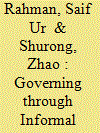

|
|
|
|
|
| Summary/Abstract |
In their post-authoritarian period, civilian governments in transitional democracies have often been battered by unelected power centers. Where do these unelected forces derive their power? This article addresses this question through a case study of Pakistan. Since the 2018 elections, a decade after leaving formal political office, the Pakistani military has asserted greater control over civilian government. Using the concept of informal institutions of political participation as an analytical framework, we argue that when formal forms of control become untenable due to legitimacy and/or functional constraints, the military turns into a Janus-faced institution, visibly acting as a formal state organ while invisibly protecting its institutional interests through what we call “informal mechanisms.” The article explains how Pakistan’s pre-2018 political situation dictated a quasi-military regime more suited to the military’s interests than direct military rule.
|
|
|
|
|
|
|
|
|
|
|
|
|
|
|
|
| 5 |
ID:
181879
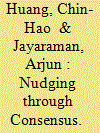

|
|
|
|
|
| Summary/Abstract |
With its emphasis on organizational minimalism, how does ASEAN induce change in its members’ policies? This paper examines the impact of consensus within ASEAN on haze mitigation in the Indonesian archipelago. When ASEAN articulates its environmental initiatives with a strong consensus, this clarity in its norms incentivizes emulation. The stronger the consensus within the group, the more compelling it becomes for members to adopt the agreement. Such prosocial behavior reflects nudging. Strong ASEAN consensus is a precursor of nudging that leads to dimmer hotspots. This study draws on discourse analysis of ASEAN summit statements on the haze, R programming to analyze NASA data on the brightness of peatland hotspots, and a case study to illustrate the causal mechanism. The findings identify ASEAN’s role in environmental governance, particularly with respect to when consensus-based nudging is more or less likely to incentivize member states to curb transboundary haze.
|
|
|
|
|
|
|
|
|
|
|
|
|
|
|
|
| 6 |
ID:
181880
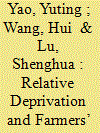

|
|
|
|
|
| Summary/Abstract |
Land expropriation is a common source of grievances and resistance from farmers in China. Based on survey data, we propose that farmers’ sense of relative deprivation is one of the causes. Our study focuses on compensation distribution in villages, where village collectives are the reference for comparison. Relative deprivation is measured by the ratio of farmer compensation to the standard government compensation; the gap between these is roughly the compensation retained by village collectives. The outcome variable is farmers’ willingness to participate in village governance. The empirical test is based on 2017 data from the Chinese Family Database of Zhejiang University and compensation standards data collected by the authors. Nearly 75% of respondents received less than standard compensation, which indicates widespread relative deprivation. And the greater the relative deprivation of farmers, the more willing they are to participate in village governance.
|
|
|
|
|
|
|
|
|
|
|
|
|
|
|
|